Enjoy the Banquet, Dad. We love you.
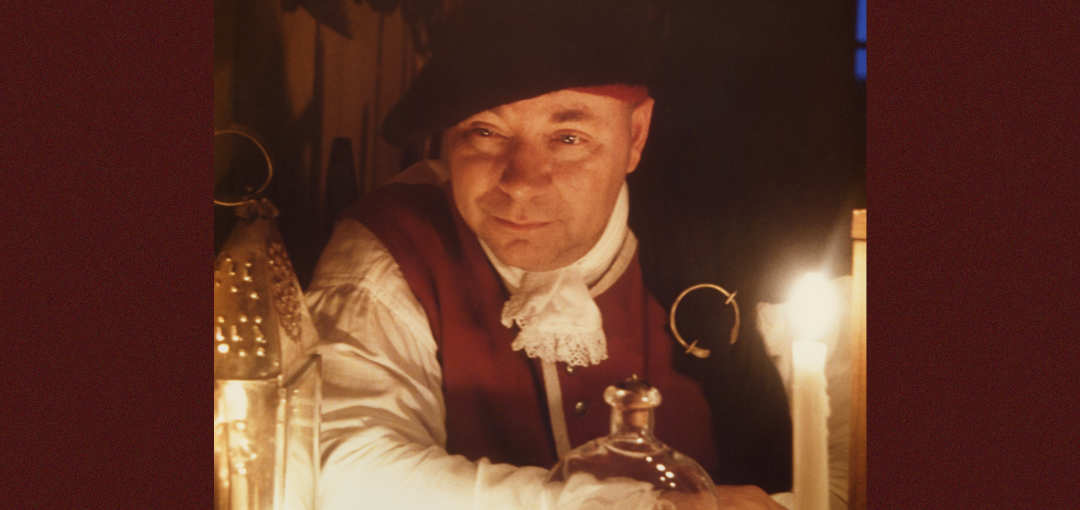
Mark O. Hagenbuch, cofounder of this site, died on February 25, 2025. Two services were arranged for him, according to his final wishes. The first was held on March 15th at St. John’s Lutheran Church in Watsontown, PA. The second was on May 31st at Dills Tavern in Dillsburg, PA. I read the following version of his eulogy at the church service:
In the 1958 film, Auntie Mame, the title character passionately exclaims: “Live! That’s the message. Life is a banquet and most poor suckers are starving to death!” Mark Odis Hagenbuch was fond of this quote and, after reciting it, he would often say: “But I’m not starving; I’m living life to its fullest!”
Dad’s zest for living touched all of us in whatever role we knew him: husband, father, grandfather, brother, friend, teacher, principal, sergeant major, or board member—to name only a few. His many roles kept him busy. Of course, you already knew that if you ever tried to get onto his calendar!
Yet, Dad always made time for us. In college, I was rear ended while driving my parents’ car. I nervously called Dad, who stopped what he was doing and listened. When I finished explaining, he had a few questions: “Are you hurt?” “No,” I answered. “Can you drive the car?” “Yeah. I can.” “Does the CD player work?” That one confused me. “Sure?” I said. “Well, then, you’re good!” he laughed and so did I.
Live! That’s the message.
Mark was born a farm boy, and he spent his childhood running through the green fields and rural towns of Montour County, Pennsylvania. “Play is a child’s work”, a quote attributed to Maria Montessori, would later become his mantra as an educator. The youngest of four children, Dad learned to be independent, especially once his older siblings had gone to school or moved away. Dad helped his father and mother on the farm, watched classic TV shows and movies, and read stacks of books like Cobblers’ Knob. Literature expanded his worldview and his imagination blossomed. Later, he would passionately recall climbing into a cardboard box and sailing up and over the barn before landing on the other side. Whether imagined or not, Dad’s boyhood memories guided him as he grew older.
Dad was a believer and the family church, Oak Grove Lutheran, fostered his faith and shaped his mind. Within its sanctuary, he played hymns on the organ. Generations of Hagenbuchs sat in the pews and listened, while many more lay at rest in the cemetery. After church, his great Uncle Perce would walk amongst the gravestones and tell him stories about the relatives buried there. Dad’s love of family, genealogy, and learning were all cultivated at that little country church.
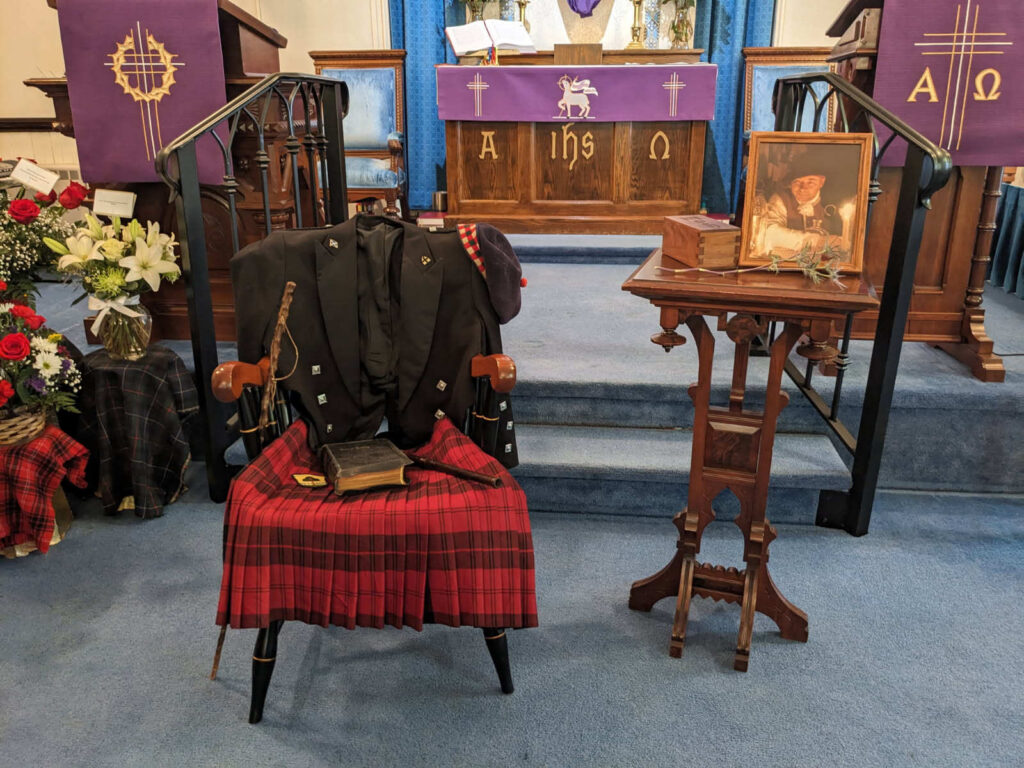
An “empty chair” full of Mark Hagenbuch’s things was placed at the front of St. John’s Lutheran Church
When Mark was 13, he and his parents moved off the farm. He started at a new school and was an outsider. Mark always had a sense of humor, so he found the best way to make friends was to “make ’em laugh”—just as Donald O’Conner did in the 1952 film, Singing in the Rain. Mark became the class clown at Milton High School. Still, he never lost his appreciation for hard work and held several part-time jobs such as stocking shelves at Sheet’s General Store.
Dad was fond of learning and was the first in his family to go to college, where he majored in elementary education. He pledged the Sigma Pi fraternity and formed lifelong friendships, including with Guy Tanner, whom he called Albie. Albie, in turn, called Dad, Odis. Odis worked in the dining hall dish room, had a pet iguana named Pythagoras, and partied significantly more than he studied.
Live! That’s the message.
During college, while working one summer at a shoe factory, an attractive coworker asked if Mark knew where to purchase duck feed. That coworker was Linda Faye Gutshall, a minister’s daughter. Her family was on vacation and she was in charge of caring for the animals. Mark, being a farm boy, knew exactly where to purchase feed and drove Linda to a nearby mill. The two started dating. By Dad’s own account, Linda was both the carrot and the stick needed to improve his lagging grades. He graduated a semester early, got a job as an elementary school teacher, and they married—in this very church. Dad would go on to earn his master’s and doctorate degrees. Mr. Hagenbuch became Dr. Hagenbuch, and he served for over two decades as elementary principal in the community of Dillsburg, Pennsylvania.
Dr. Hagenbuch was a leader. With children, teachers, staff, and parents, he was thoughtful and nurturing. He listened to and respected others’ ideas, even when he personally disagreed. Dr. Hagenbuch was decisive and promoted structure in his school—and it was his school after all. Yet, he also believed in personal autonomy and freedom. He fostered a learning environment that empowered individuals to take ownership of their successes and their failures. After mistakenly wishing a student happy birthday, Dr. Hagenbuch and the student created an informal game where they would purposely misremember holidays, greeting one another in the hallway with a “Merry Christmas” in May or a “Happy Valentine’s Day” in October. Dr. Hagenbuch knew that no matter our age, we are all children.
Live! That’s the message.
The 42nd Highland Regiment saluted Malcolm MacWilliam (Mark Hagenbuch) at the Dills Tavern memorial celebration.
Mark was passionate about history of all types. As a teacher, his classroom walls were draped with Revolutionary War flags, and he led his students to raise money to erect historical markers and save monuments. However, studying and teaching history wasn’t enough. He wanted to live it, opening a door to what would become a lifelong pursuit. Uniforms were made by Linda, and Mark began doing programs about early America. As his knowledge grew, so did his desire to experience the past first hand. He learned to camp and hunt as a colonial frontiersman. Eventually, he joined two reenactor groups: Muskets of the Crown and British Brigade. Mark became Malcolm MacWilliam and portrayed an 18th-century Highland soldier.
For Malcolm, reenacting wasn’t a hobby; it was a lifestyle, one that he fully embraced after retiring. He attended events as a Jacobite, a longhunter, and a colonial civilian; or as a soldier in the French and Indian War, the Revolutionary War, and the War of 1812. He fought in countless battles: Bushy Run, Brandywine, Ticonderoga, Niagara, and Waterloo in Belgium—where he slept on the ground wrapped in an oil cloth as it poured rain. But inclement weather was no bother, for what Malcolm appreciated the most were his friends, including those who left too soon: Mike Slease, Kit Brown, Rich Fox, and Jack Augustine. Together with his friends, Malcolm marched and campaigned, drilled with a musket, hand pleated kilts, sang songs, wore a blonde wig, told jokes about his Uncle Angus, started fires with flint and steel, shouted huzzah!, recited the Address to a Haggis, and made music with a flageolet, a type of flute, that if asked he would play with his nose.
Live! That’s the message.
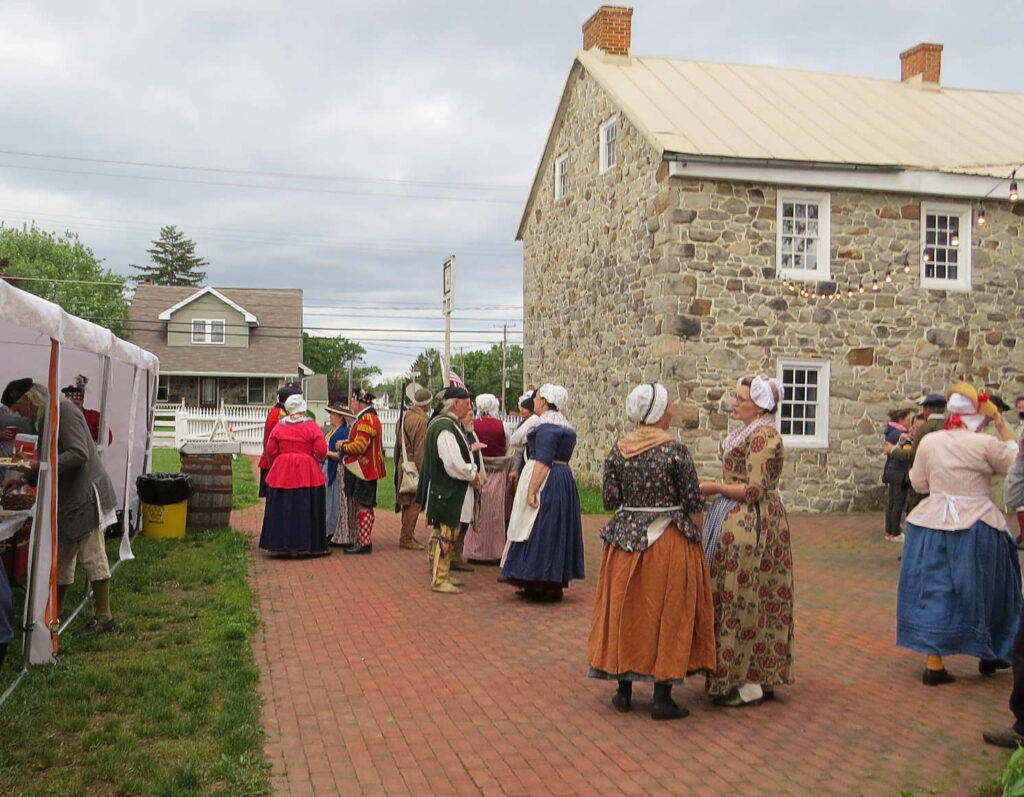
Friends gathered, many in 18th-century dress, at Malcolm’s memorial at Dills Tavern. Credit: Doug Claytor
Dad was a dedicated husband, father, and grandfather. He loved and cared deeply for Mom, and they spent over 50 years together, traveling the United States, Canada, and Europe, yard saling, and raising their three children. He believed in service to one’s family, friends, and community. When a friend passed, Dad honored a request to care for his wife throughout the remainder of her life. At home, Dad did whatever needed done. He mowed the yard and split firewood, just as willingly as he cleaned the pool or baked an apple pie. If he was tested—something I surely did—Dad, more often than not, responded with restraint and compassion. He dressed as Santa Claus at school, gave rides in his oversized pickup truck, told his children just how proud he was of them, and helped others around him. As a father, he modeled that there is no one way to be a man.
In the 1949 film, She Wore a Yellow Ribbon, John Wayne states “Never apologize, mister. It’s a sign of weakness.” Yet, Dad demonstrated that asking forgiveness is a courageous act, one that brings us closer to God, repairs relationships, and permits us to work together to achieve common goals. As a principal, father, and member of many organizations, he mediated conflicts, acted with discretion, listened to concerns, and brokered deals. Dad wanted to see those he cared about the most bury the hatchet and get along. Even so, he knew when to stand firm and confront adversity. He marched to the beat of his own drum, a trait that brought him success and accolades, although occasionally drew ire. Still, some of his harshest critics, out of respect or perhaps necessity, turned to him for his sage advice and level headed guidance.
Mark Odis Hagenbuch lived a rich life of 71 years and was so many things to the people who knew him. Mark, Dad, Malcolm, Odis, Dr. Hagenbuch, husband, father, friend, brother, principal, and sergeant major—how will we remember this bountiful life filled with unique experiences, service to others, and leadership? While you ponder this question, picture in your mind a small farm in rural Pennsylvania. Near the barn rests a cardboard box and within it sits a boy. He is playing. There is a bonnet on his head, a tall stack of books at his side, and a flageolet tucked under his arm. The boy smiles and the box lifts from the ground, gliding up and over the barn. The boy laughs and, this time, he does not descend. He and his box keep going, over the fields, past the neighbors’ farms, and beyond that little country church, until at last he is out of sight.
Enjoy the banquet, Dad. We love you.
The Dr. Mark O. Hagenbuch Living History Scholarship Fund provides financial support to graduates of Northern York County High School in Dillsburg, PA who have a passion for history and are pursuing higher education. Dr. Hagenbuch served as principal of Northern and South Mountain Elementary Schools from 1987–2008. He believed that the best way to understand the past is to experience it firsthand. Historical reenacting, genealogy, and vexillology were part of his life’s work as an educator and community leader.
Donations can be made to the Dr. Mark O. Hagenbuch Living History Scholarship Fund, c/o TFEC, 200 N. 3rd Street, 8th floor, Harrisburg, PA 17101, or online at www.tfec.org.

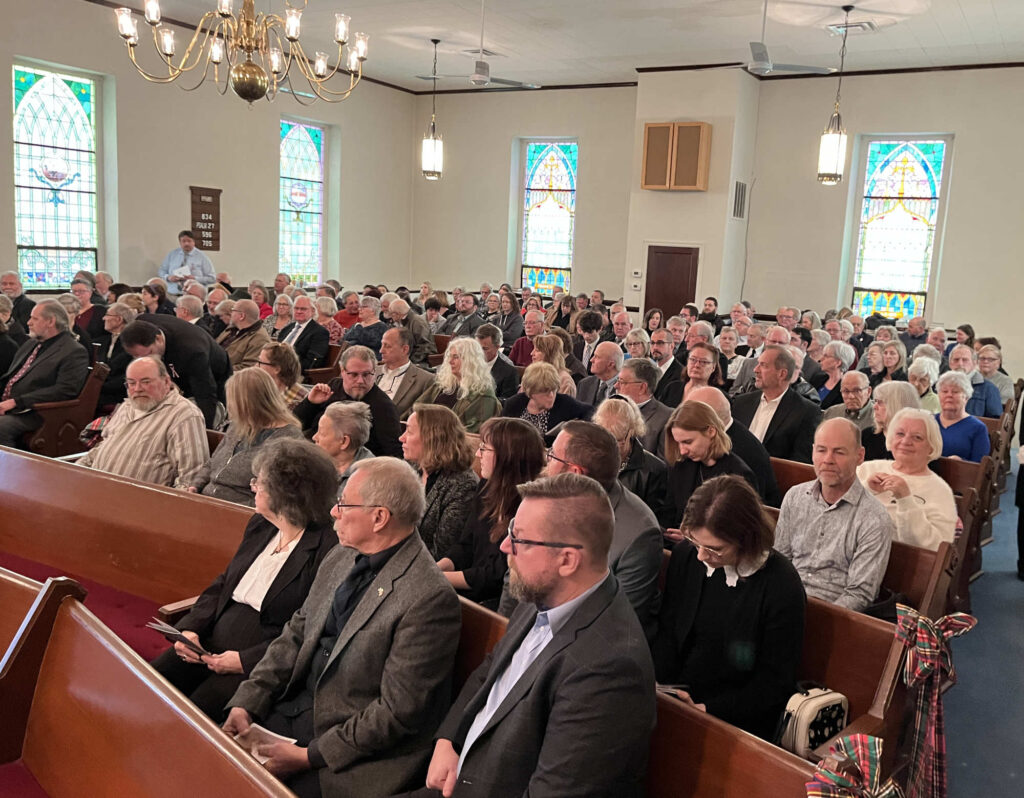
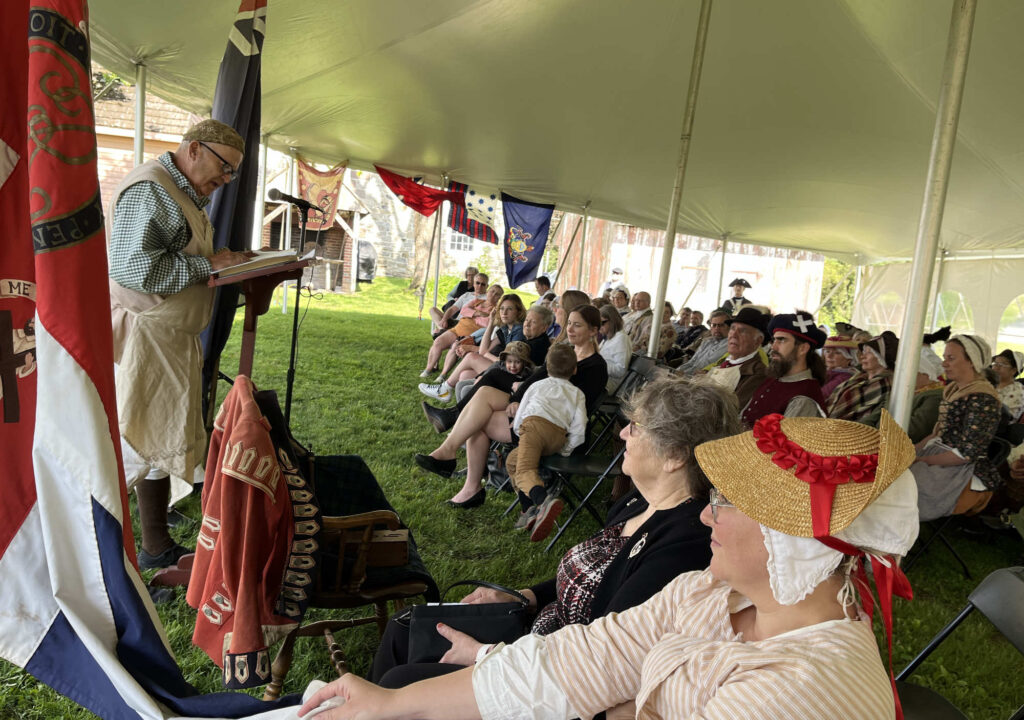
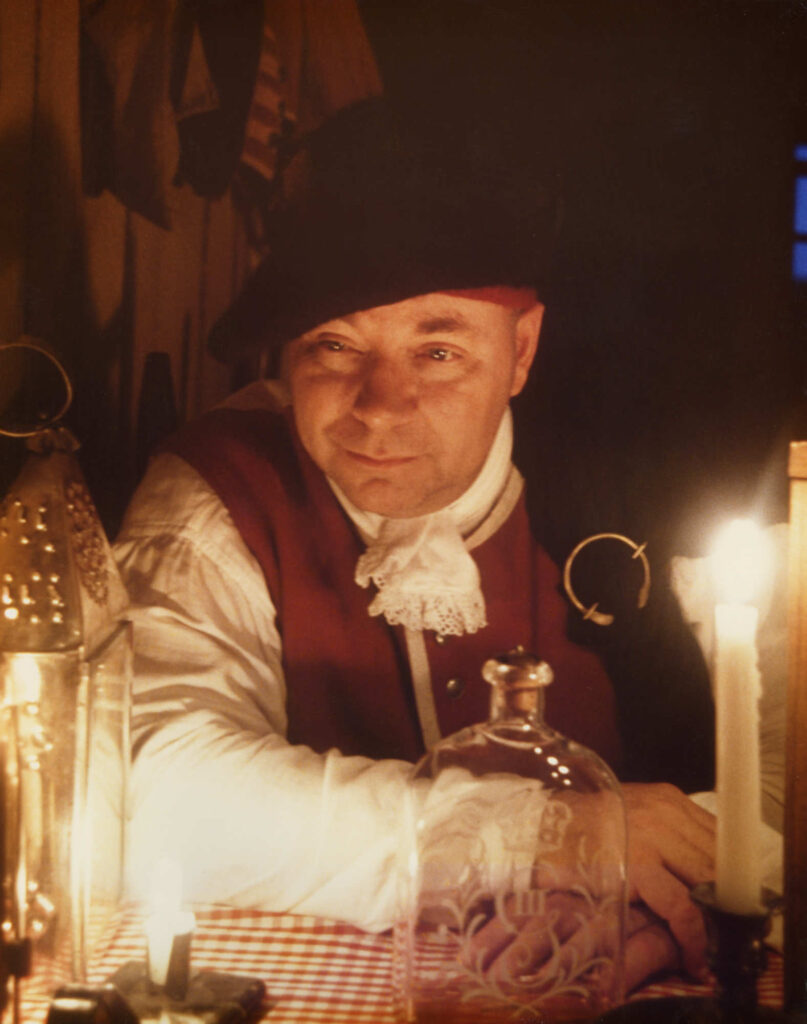
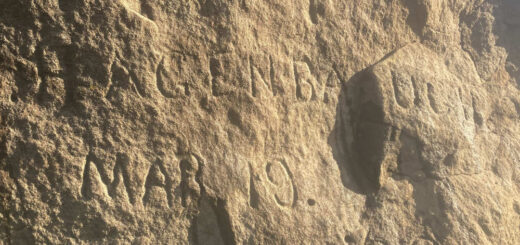
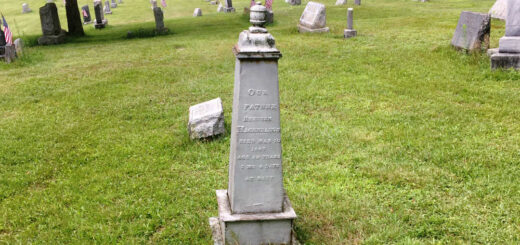










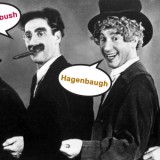




What a wonderful written tribute of your good dad. I didn’t know him well but I sure do after reading this. I am sorry for his passing way too soon. I know you will carry his essence with you always. May the good memories fill you with warmth and peace as you travel thru this wonderful life.
Yvonne Faus ; Brad’s wife
Hi Yvonne. Thanks for your kind words about Dad and for writing. I hope that you both are well! Please give my best to Brad as well 🙂
Thanks for the sharing the life of your Dad, fully an abundant one serving God and mankind in so many ways!
Andrew,
This is a wonderful description of your dad’s wonderful life. The boy in the box at the end brought tears to my eyes. The joyous part is that all of us will have sort of a box one day and reunite in a better place with Malcolm! A most wonderful friend who has a wonderful family. Thanks for all you have done to perpetuate his memory.
Andrew
This was very moving and a great tribute to your dad. I met you both last summer at Hidlay church where I grew up. Ann Brandt was my aunt.
I enjoy reading the Hagenbach emails.
I saw in the paper from Bloomsburg a property transfer.
Craig W. & Angela S. Hagenbach
Danville to
AG Rentals LLC
a question passed through my brain.
Could they be related?
Blessings to you and all related Hagenbach s .
Hi Linda. Great to hear from you, and I remember you of course. Dad and I met you, unexpectedly, when we were walking around Hidlay Church last May 🙂
Yes, we are related to Craig and Angela. You can see Craig’s place on our family tree here (as one of the children of Clyde Hagenbuch): https://beechroots.com/person/1016/clyde-watson-hagenbuch Craig’s grandfather, Hiram Jr., is the brother of my great grandfather, Clarence.